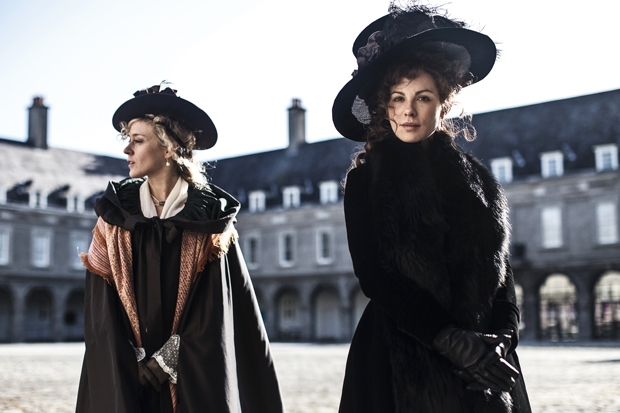Love & Friendship is based on the little-known Jane Austen epistolary novella, Lady Susan, which was not published until after Austen’s death, and was then ill received. As G.K. Chesterton declared: ‘I, for one, would have willingly left Lady Susan in the wastepaper basket.’ Knowing what I know now and having, in fact, read Lady Susan, I, for one, would have willingly punched G.K. Chesterton in the head, had I been around at that time. And, had I wished to torment him further, which is highly likely, I might have then told him that it would one day be turned into the most delicious hoot of a film, so put that in your pipe and smoke it. I think he’d know he’d met his match.
Just as Lady Susan is not your common-or-garden Austen read — no misunderstandings; no grand balls; a splendidly wicked heroine — this is no common-or-garden Austen adaptation. All our beloved trappings are here. The sublime frocks. The horses and carriages. The magnificent country houses. But, as written and directed by Whit Stillman (Barcelona, The Last Days of Disco), this is made new by a reworking that has wit, energy, verve and a sense of mischief. And, as it’s all told at such a lick, you’ll wonder, like G.K., quite what has hit you.
Lady Susan (Kate Beckinsale) is a widow in possession of no great fortune, or any fortune at all, and is therefore in want of a wealthy husband, natch. We first meet her as she is being ejected from the magnificent country home of Lord Manwaring — ‘a divinely attractive man’ reads the mischievous caption underneath — having set the cat among the pigeons there. (He had fallen for her; his wife was not best pleased.) Lady Susan who, we are told, is ‘the most accomplished flirt in all of England’, has no scruples whatsoever, possibly wouldn’t even recognise a scruple if it bit her on the nose, and is diabolically self-justifying. As she says of Lady Manwaring: ‘If she was going to be jealous she shouldn’t have married such a charming man.’ Now homeless, she invites herself to Churchill, the country seat of her late husband’s brother, Charles (Justin Edwards), and his wife, Catherine (Emma Greenwell). Here, she sets her sights on Catherine’s brother, the hapless Reginald (Xavier Samuel). Meanwhile, she is also searching for a rich husband for her daughter, Frederica (Morfydd Clark), whom she despises, and calls ‘the greatest simpleton on earth’. Motherhood comes most unnaturally to Lady Susan, but Frederica must still land a big fish and, to this end, she has selected Sir James Martin (Tom Bennett), who is a pea-brained ninny (‘a bit of a “rattle”’, says his caption) and quite, quite hilarious.
Even though this is a walking and talking film, except in those instances when it’s a sitting and talking film, Stillman keeps everything moving fast, fast, fast while the script crackles and spits and bites. Lady Susan has a confidante, Alicia Johnson (Chloë Sevigny), an American whose husband (Stephen Fry) is insisting his wife should have no more to do with Lady Susan. ‘Oh, what a mistake you made in marrying Mr Johnson,’ she tells Alicia. ‘Too old to be governable and too young to die!’ She says it as it is, which is unusual for an Austen character. Indeed, if everyone in Sense and Sensibility said exactly what they meant wouldn’t it all be over in four minutes flat?
Lady Susan has the vitality and vivacity of Thackeray’s Becky Sharp, and is also the most interesting person in the room as well as the smartest, but, unlike Becky, she keeps us rooting for her. This is partly due to Beckinsale’s thrilling, terrific performance, which is less a performance, more a force of nature that can’t help but carry us along. Plus, while we’re shocked by Lady Susan’s behaviour, we also applaud it because we understand the constraints of the time, particularly the constraints on women, whose economic and social lives depend on finding a husband. It’s this dependence that forces them to comply with the social order, and Lady Susan is only making it all brilliantly plain, in a way that also works as a sly critique. (Throw Lady Susan in the wastepaper basket? Never!) Will she come undone? That’s what we want to find out and I hope I’m not giving too much away when I say she gets exactly what she deserves. (Yay!)






Comments